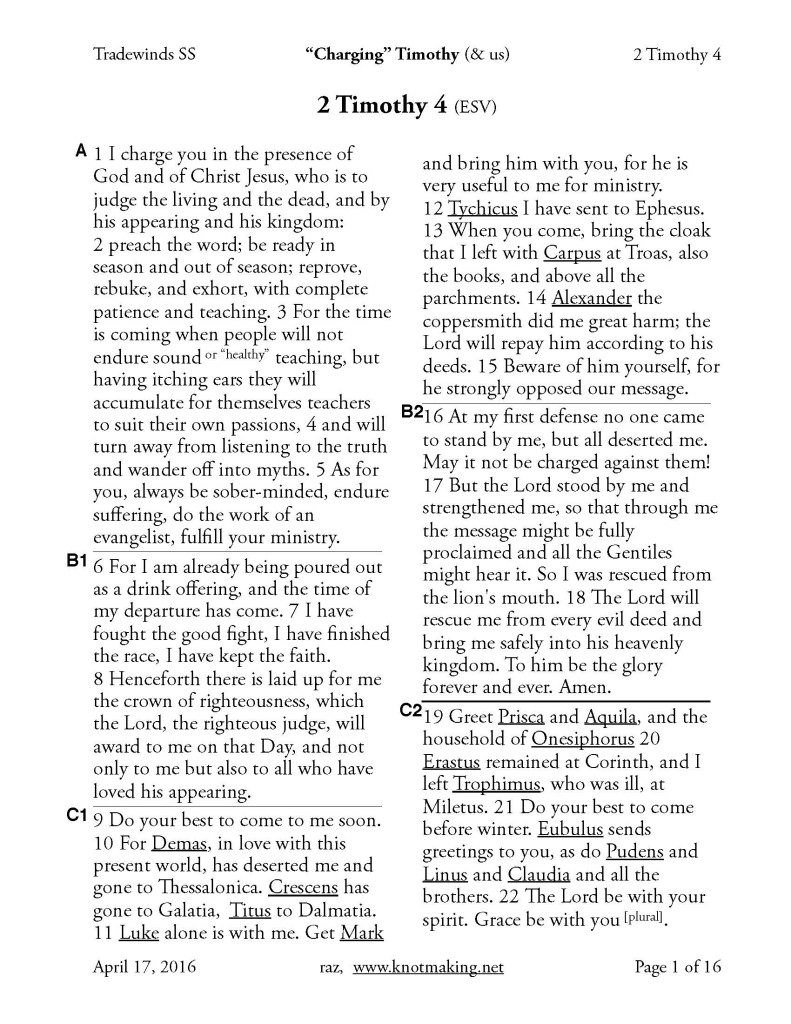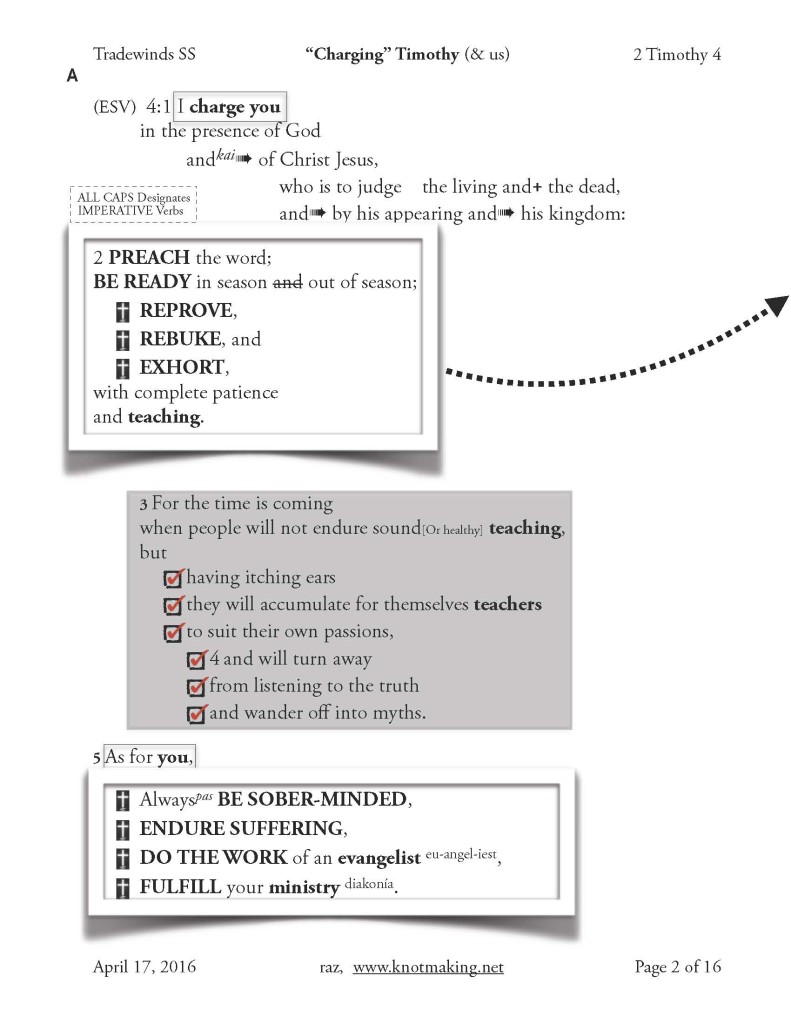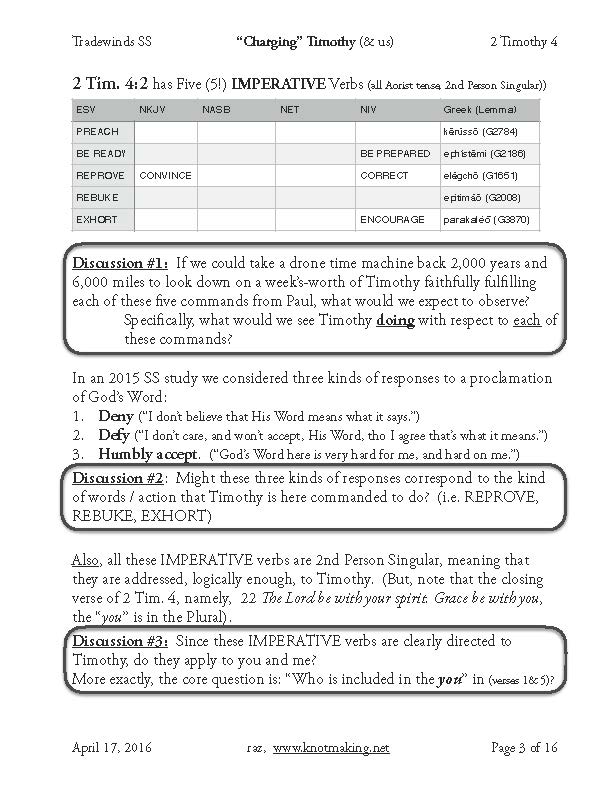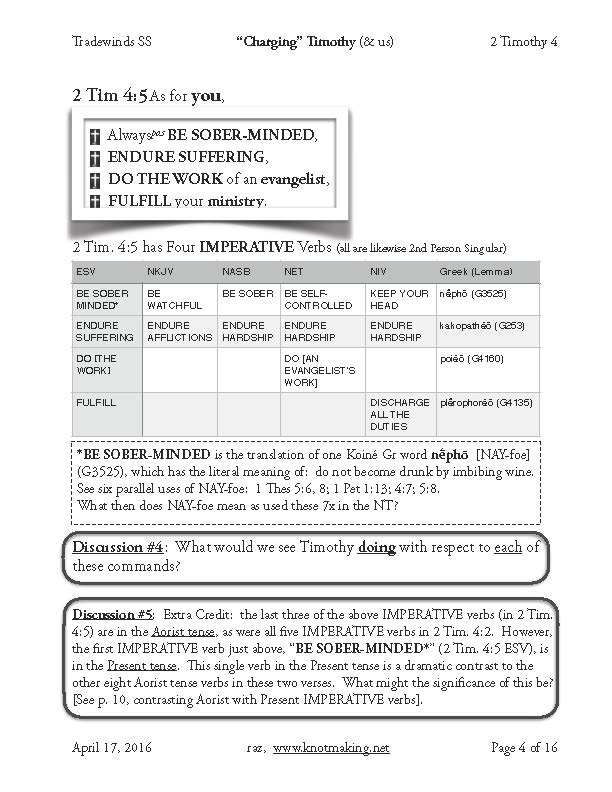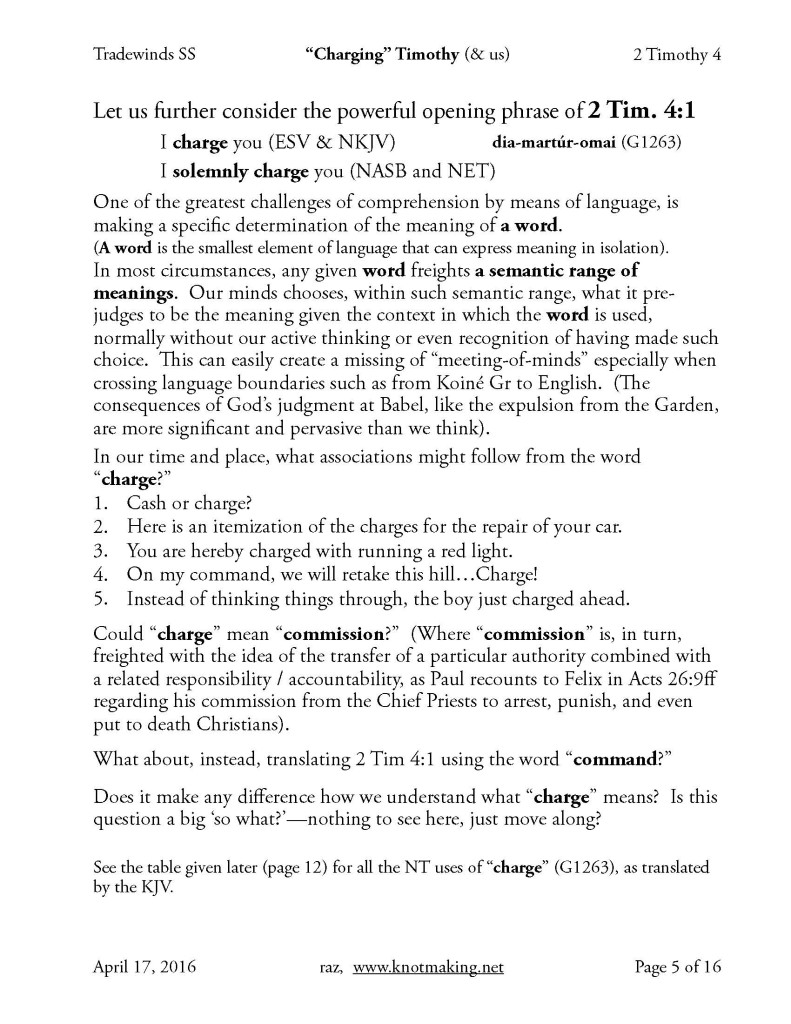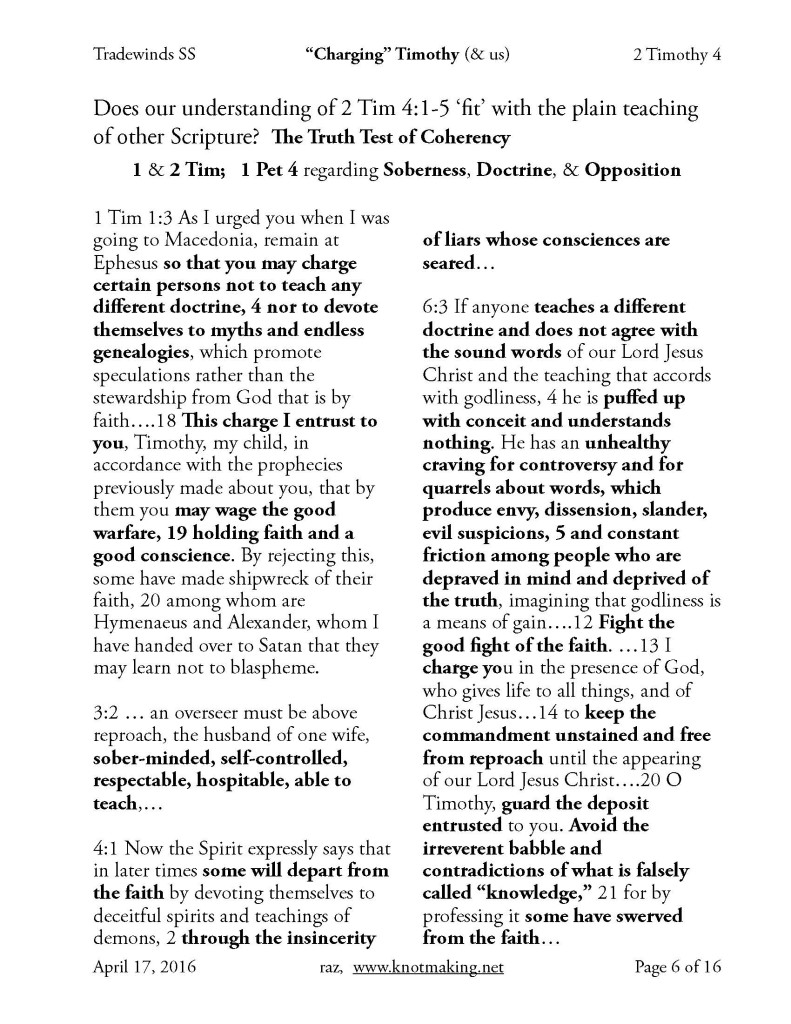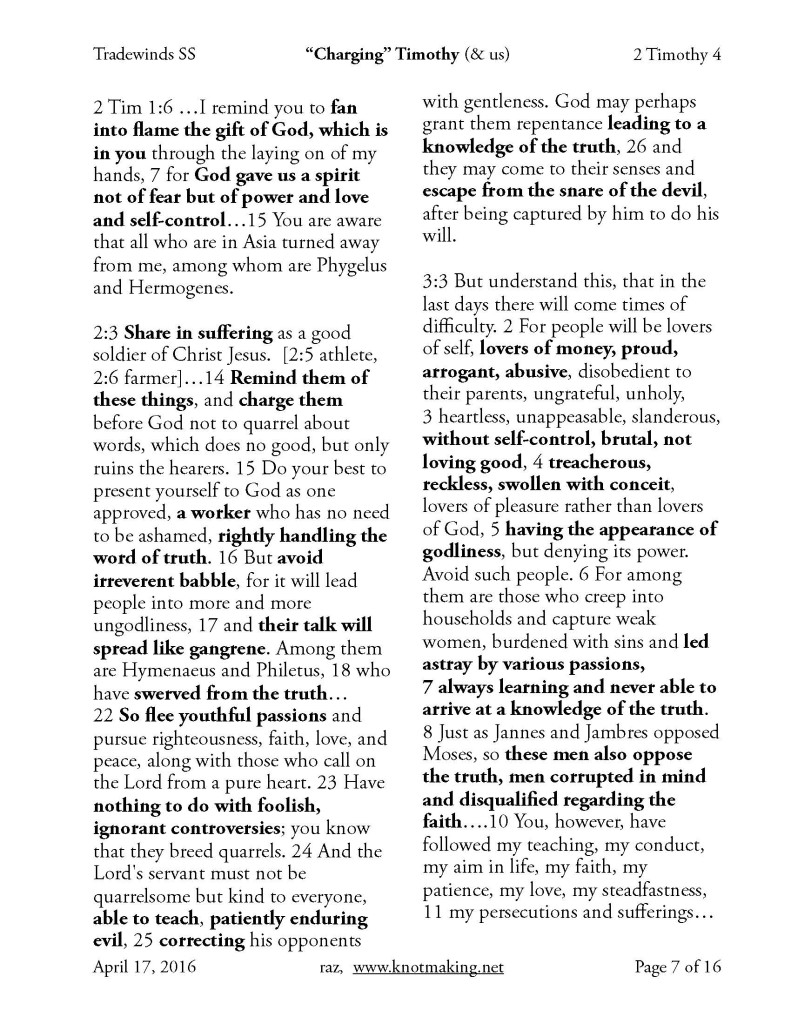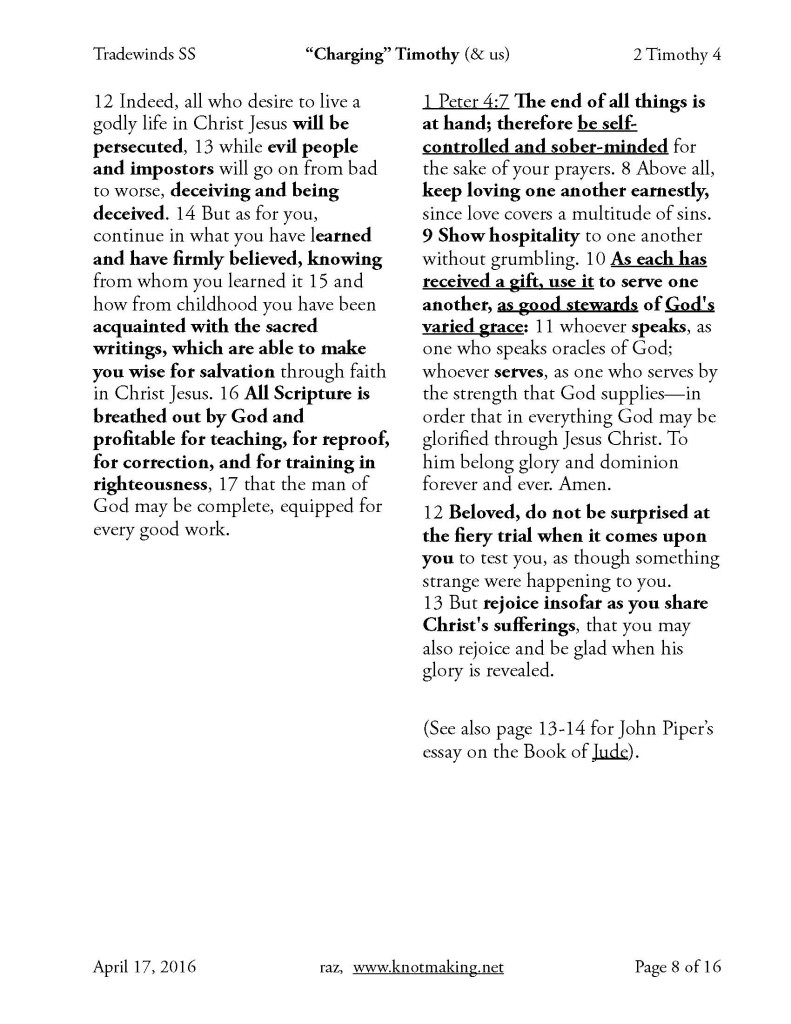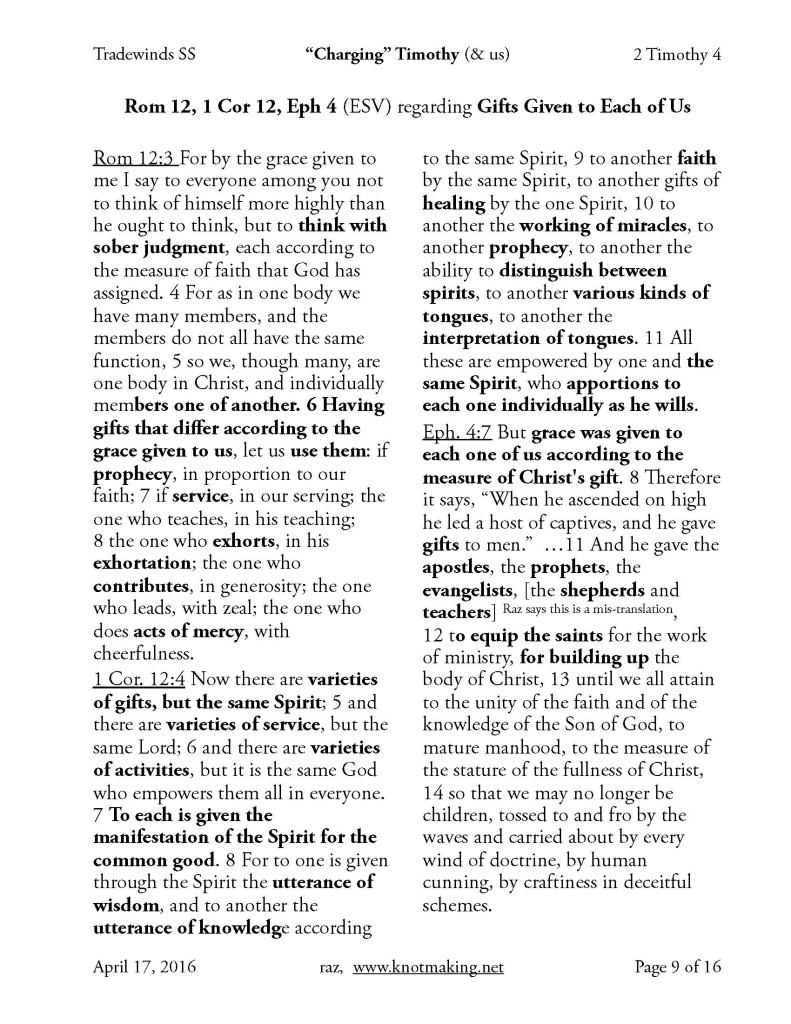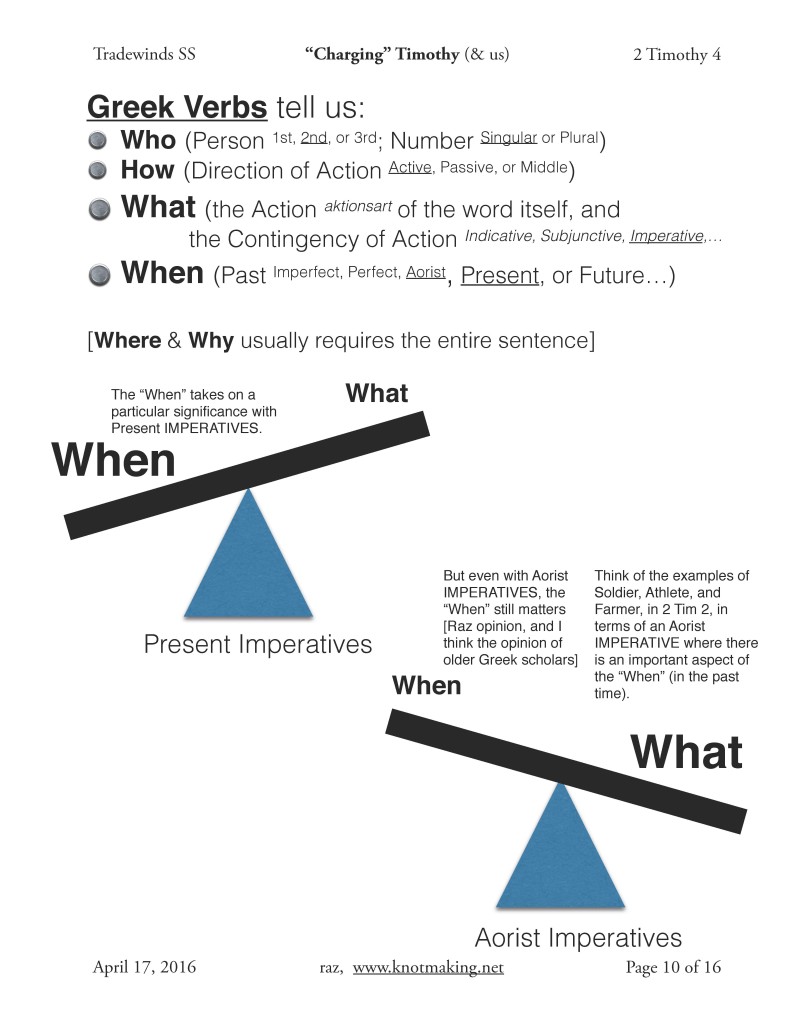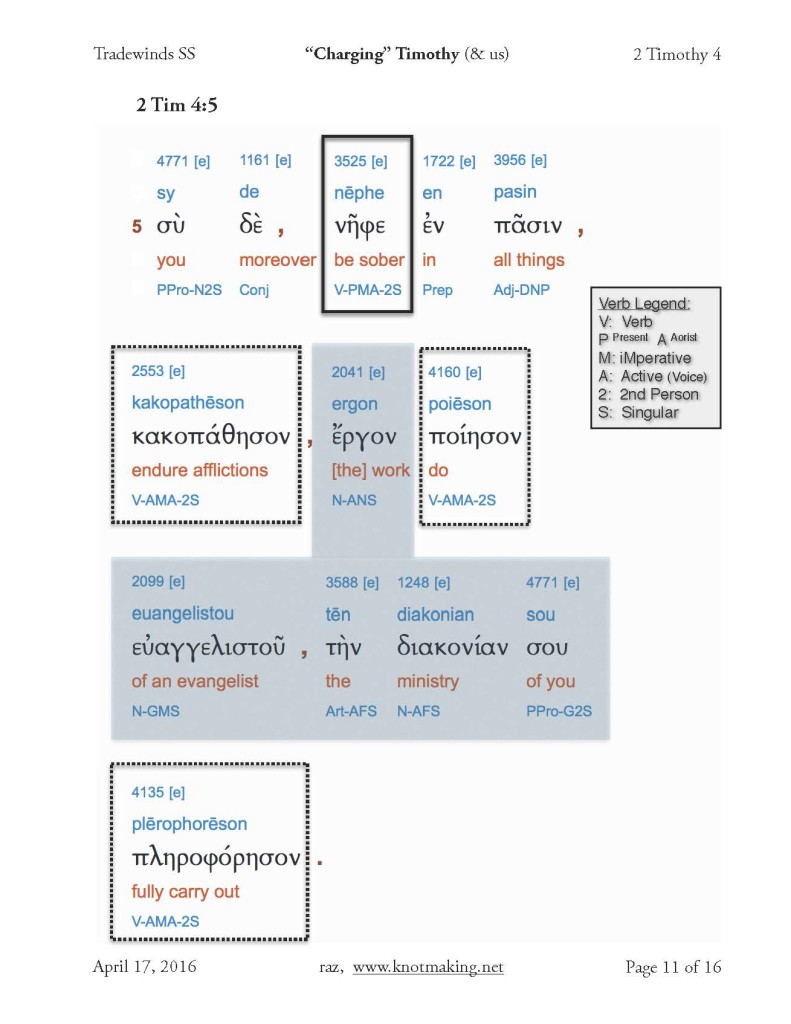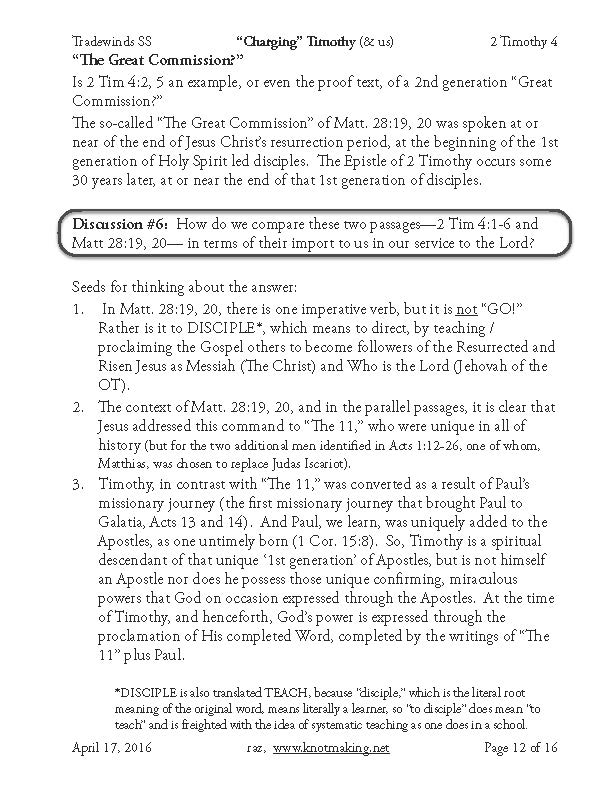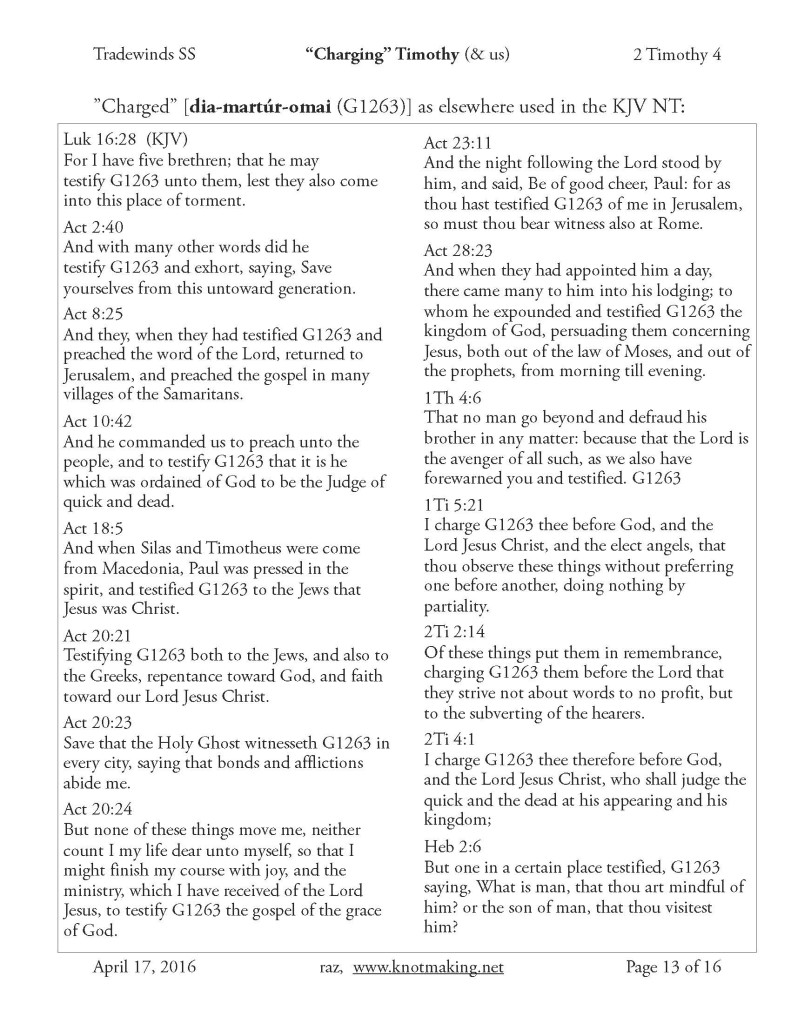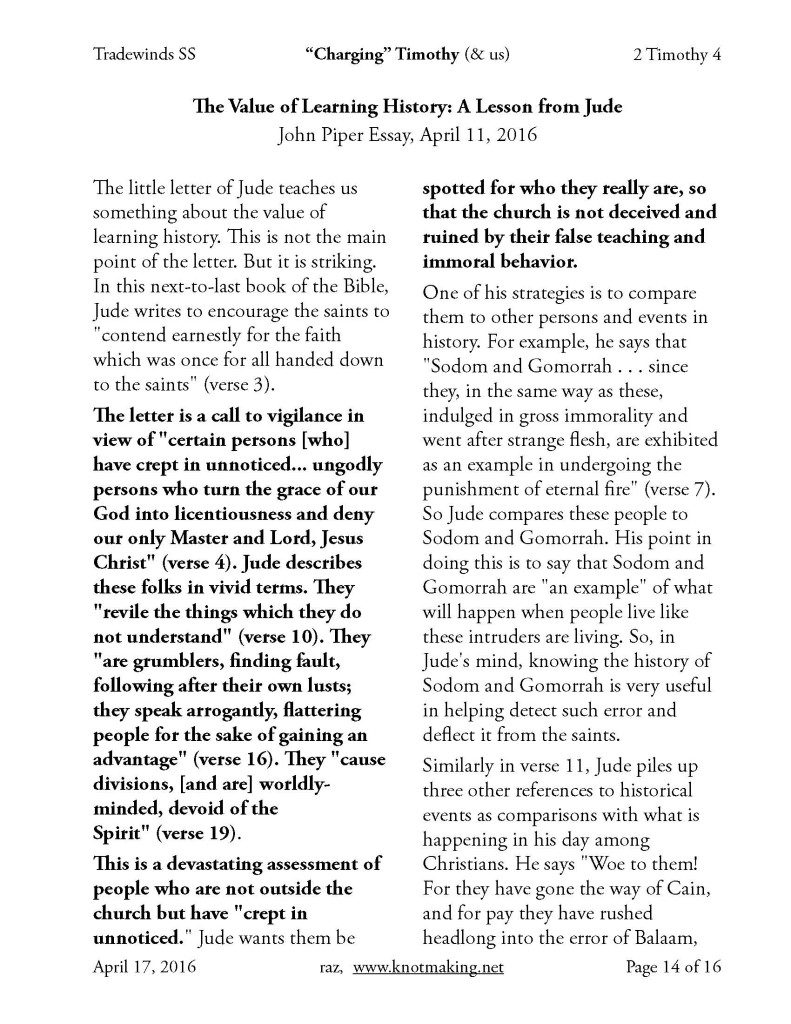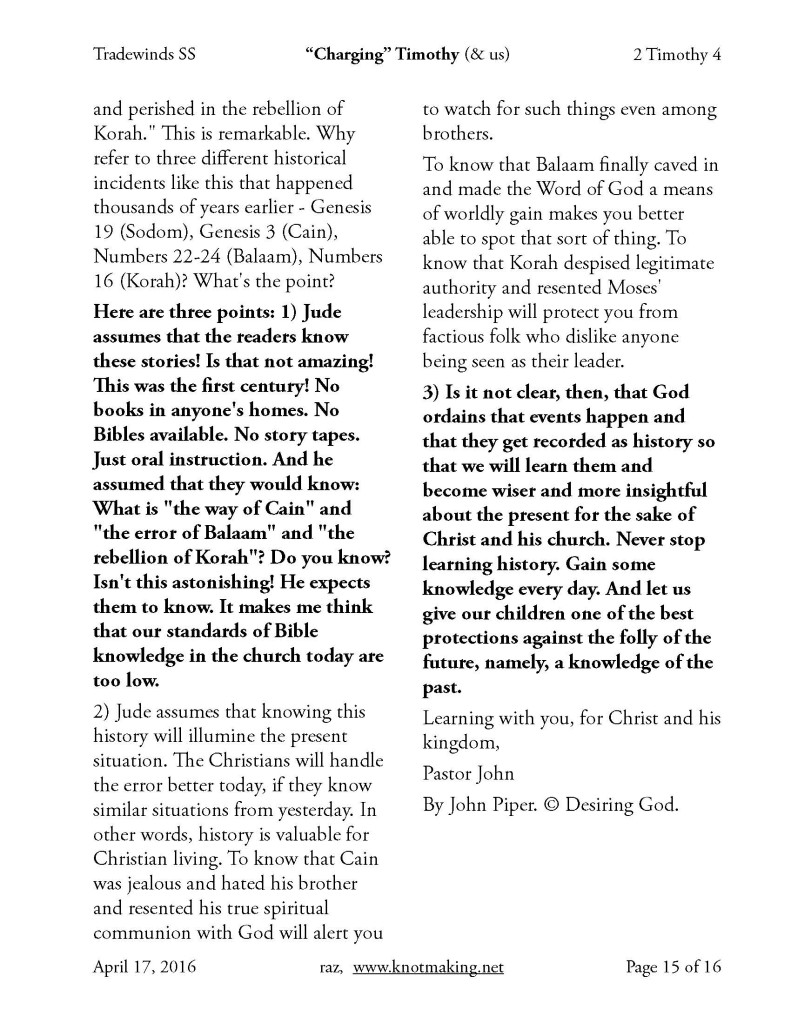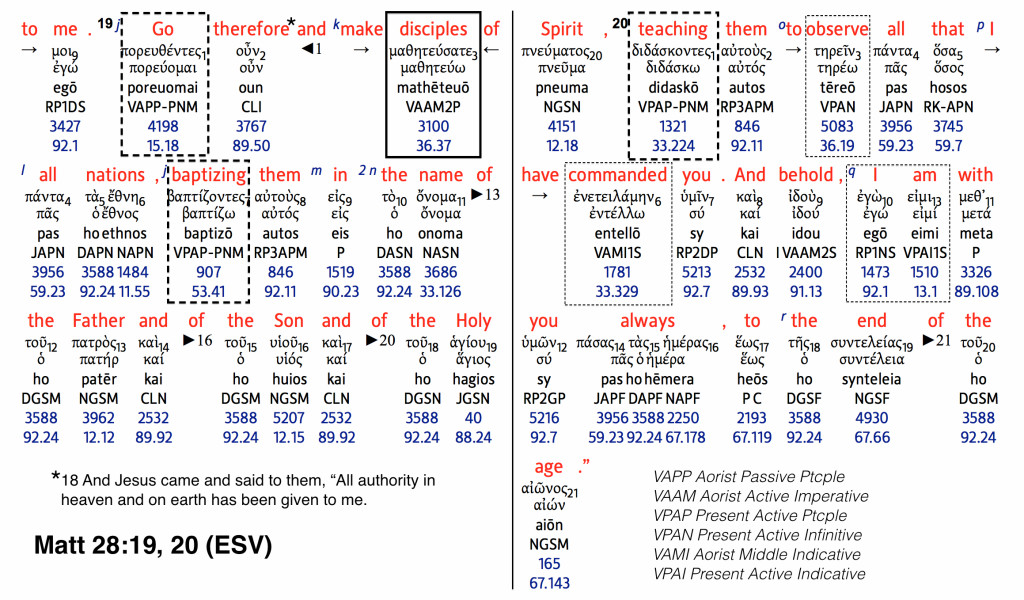Below we have a study help regarding Paul’s last words that are part of the New Testament (NT), in 2 Tim 4. The focus of this study is actually just the first 6 verses of 2 Tim 4, because of the unusual presence of 9 imperative verbs, contained in just two of these verses.
The Aorist tense in Koine Greek is normally used to designate a specific, ‘point in past time’ occurrence. However, conventional, current Greek scholarship teaches that such tense applies only to verbs in the “indicative” mood, meaning when expressed (parsed) as present, statement-of-fact language. When the imperative mood is used with the aorist tense, such scholarship says, time has no significance to the imperative verb. Rather, in such case, the Greek parsing is all about the aktionsart (the inherent action) of the verb, with no reference to its time of action.
I am not anywhere close to being a scholar, but offer this somewhat nuanced view. The “what” and “when” of a verb have a balancing emphasis: they could both be important, or the what can be more important than the when, or vice versa. Here’s my argument for why the tense of an imperative aorist verbs is not unimportant / irrelevant: it’s use brings to mind a prior (past) commitment which has enduring and dominating implications. For instance, in everyday life the commitment one has made in a marriage vow has an imperative present reality though (in Greek) the vow itself could be expressed by the aorist tense. The idea so expressed is that there is a present imperative importance to the state of marriage but it arises because, and importantly because, of a prior, one-time commitment that one has made.
In 2 Tim 2, Paul records three example categories of a professional calling: a soldier (Roman), an athlete (a Greek competitor in the Olympic Games), and a farmer. Each of these categories reflects this dichotomy of an aorist commitment that has a present imperative connected to it. For example, if one commits to the career / calling of being a farmer, something done once (and looking back at such commitment made in the past) then there is all manner of present imperative actions that are directly connected and derive from such past decision. The aorist imperative then connects the idea of the prior calling and commitment to the actions now absolutely mandatory to fulfill the necessary obligations.
So in the below chart, I show that when an aorist tense is used with the imperative mood the emphasis is indeed on “the what,” the aktionsart, but “the when” is not only not important, it is the context for which the present command is relevant. (And there is probably no current Greek scholar who would agree with what I have just written–so consider consider this perspective with care).
Regarding the subsequent charts, there is a widely held belief that there is “The Great Commission.” However, in my view, which I will defend below, there is no such thing in the Bible. How such dramatic claim got into our Christian consciousness is a long story with some necessary speculation. Here’s the short version.
A Christian giant, especially in missionary lore, is J. Hudson Taylor (1832 – 1905), who founded and dedicated his life to proclaiming the Gospel in inland China. He lived in the late 19th and early 20th Century. Among the many notable aspects of his life was his commitment to recruiting missionaries to join him in a life of humble privation deep in rural China, supported by the donations of Christians ‘back home’ (of course whose generosity to give was moved by hearing of Hudson Taylor’s need and God’s affecting the hearts of those Christians to donate).
Taylor was a tireless proponent of both the missionary need and the need for missionaries. He spoke at many conferences in England, Europe, and the U.S.. In so doing, he came to know Dwight L Moody (1839 – 1899), a notable missionary in his own area, and through Moody, C.I. Schofield (1843 – 1921), the creator of the Schofield Study Bible, first published early in the 20th Century (1909, heavily revised in 1907, later further revised and published in 1967).
Taylor used the passage in Matthew 28:19 and 20, and he popularized it, as “The Great Commission,” extolling the importance of his missionary work, the money needed for it, and particularly for encouraging many others (hundreds) to join China Inland Missions as missionaries themselves. That was what he believed was God’s calling on him, and we can admire that conviction and life commitment.
But does Matt. 28:19, 20 teach–and even more so command by imperative verb usage–that this is “THE GREAT COMMISSION” and of us all?
It appears that Taylor’s meeting with Moody and importantly with Schofield, led Schofield to insert a paragraph heading in his Study Bible for Matthew 28 reading “The Great Commission.” This heading (technically called a pericope), like all other headings in all other Bibles, is not part of Scripture but was added by men to make reading the Bible easier to read and by which to organize the readers thoughts. There is nothing inherently wrong or evil about doing so–in fact every Chapter identification (like Matthew 28) and every verse (like 19 and 20)–was added by men and were not part of the original manuscripts. The chapter designations came about 1000 years after the Bible was written in the original manuscripts, and the verses about 500 years after the chapters. (If one were to use a time machine and talk to the great church father Augustine and asked him to turn to Matt 28:19 or John 3:16 or Rom 8:28, he would have no idea what you were talking about; nor would he know what you meant in referencing “The Great Commission.”)
Returning to the paragraph heading in Scofield’s Bible, his inserted phrase (“The Great Commission”) was adopted by many publishers subsequent to that Bible edition such that it’s in many, but not all, Bibles published today. But common and frequent though the heading may be, it does not make Scripture. And, I believe, such paragraph heading does not accurately portray Scripture as it is certainly not “The” commission, meaning the only one, nor is “Great,” meaning that it is somehow the most important, and it is not even a “commission,” as the word does not occur in most Bibles except in a few negative contexts such as Acts 26 where Paul recounts the “commission” he received from the High Priests who, under the authority given to them by the Roman government, ‘commissioned’ Paul to chase down, arrest, torture, and even put to death Christians.
The 2 Tim 4:1-6 passage, with 9 imperative verbs have a greater relevance to you and me today than Matt 28:19,20 which it, and all the parallel passages, was expressed to “the eleven” Apostles, a unique group, for which there are no successors. We are of course descendants by faith, but as Timothy was not himself an Apostle, nor was there any others after Paul. (Paul was added to “the eleven” as he himself says in 1 Cor as one untimely born, but demonstrated to be so included by God’s great signs worked in him for the purpose of completing the text of the New Testament).
The Enemy is always in attack mode against Jesus Christ, tearing down as much as the Enemy possibly can, any words about the Person and Work of Christ. The Enemy sometimes does that by marshaling authorities, often “religious” authorities, to shut down any true words spoken on the work of Christ. Other times the Enemy uses the noise of distraction and general confusion to obscure the true words. Still other times, the Enemy uses distorted meanings of Biblical words or expressing false ideas by what sounds like a Biblical teaching, as I believe he has done in this case. If “THE GREAT Commission” is to “GO into all the world,…” then all the rest of the NT, and the full body doctrine for believers of the Person and Work of Christ is of very little comparable importance.
So, in short, it does matter to get an right understanding of any Scripture, especially that touted to be the central, most important command. (Even Jesus when He was asked for the single greatest commandment, in the context of the Old Testament, answered by given two!)
Small sidebar on the Schofield Bible (SB): The original SB of 1909 had serious doctrinal errors contained in its footnotes. C.I. Schofield was no Biblical scholar; even his “Dr.” designation was an honorary degree. The original edition of the SB had useful cross-references and other study tools but it was seriously flawed even in accordance with mainstream Christian scholarship. This led to the 1917 edition, which edition is still widely available though not current in print, and with further revisions to the 1967 edition which is currently in print.
There is a controversy which continues today regarding the perspective Schofield used in structuring the SB in its original embodiment, and which continues to this day, regarding “dispensationalism” and its related “eschatology” (the end times of the church and the church “age,” e.g., the Rapture, the Tribulation, and Millennium). Nothing in my comments here addresses the issue of dispensationalism and its derivative conclusions as to the end times.
There is likely, however, a connection between Schofield’s perspective on dispensations and his highlighting “The Great Commission,” namely: a reasonable conclusion of dispensationalism is that what withholds the occurrence of the end of all times is, (simplistically stated), that “The Great Commission” must first be completed, hence it is indeed “THE GREAT Commission” because it is the barrier holding up the return of Christ and establishing His Kingdom. Again simplifying a complex story, Schofield appears to have been greatly influenced by (again a somewhat controversial person) John Nelson Darby (1800 – 1882), an English Bible teacher who popularized and systematized dispensationalism. Darby was an intelligent man, and influential in his time, but was not a formally trained theologian and his views were not widely adopted. However, Darby did influence Schofield, and hence the SB, which has influenced many others because of the many useful study tools in the SB. Schofield also also appears to have influenced Lewis Sperry Chafer (1871- 1952), or one might say one influenced the other; Chafer is rightfully well-known for being a founding force in the rightfully respected Dallas Theology Seminary (DTS). DTS is generally considered to be a, or even “the,” leading proponent of dispensationalism, but it has on its faculty, and has graduated, many eminent teachers and scholars in many fields of Bible scholarship. And there are many in mainstream Christianity who accept some or most of so-called “dispensationalism,” so holding such views is definitiely not heretical. But holding to dispensational thinking seems to be connected to holding to “The Great Commission” concept.
Yet another small sidebar, this one on Arminianism: The subject of Arminianism is way too vast to address here. A highly simplified summary of Arminianism is that Jesus died to pay the necessary price of sin for literally every human being (perhaps Judas Iscariot and few others excepted) so everyone can be justified from their sins, and become written in the Book of Life and so gain Heaven for Eternity if, but only if, they choose, of their own volition, to do something, say X. For some followers of Arminius, X is living a sinless life (after some initial point of belief) or a sinless life with respect to ‘the big sins’ (such as murder, adultery, …; but little lies such are not God honoring but they wont defraud you of heaven for eternity). For other followers of Arminius, X is faith alone, but faith that has to be sustained through one’s entire life; if on one’s deathbed, one’s faith goes away, then so does one’s eternal salvation. Yet other followers would say X is faith one time, “receive Christ into your heart by faith,” leading to being “born again” as a once and forever event, regardless of what one does or believes thereafter (i.e., the so-called eternal security of the Believer). In this one respect, Arminianism stands against the a central tenet of the Sovereignty of God as made evident in the Reformation Faith (sometimes sloppily referred to as “Calvinism,” as though John Calvin invented it); however, in many respects there is wide agreement between Arminians and those who are of Soverign Grace / Reformed. (so Arminians and Reformed believers can be friends, so long as they don’t discuss any Scripture that speaks to God’s Sovereignty, particularly with regard to God’s determinate will overcoming man’s ‘sovereignty’).
The relevance here of Arminianism is that it is often closely tied to “The Great Commission,” in the following way. If the determining factor, the X, for man’s redemption (salvation) and eternal life is the decision of faith that one must be express before death, the X, then this creates an awesome responsibility for each one who is already a believer to assure that every living non-believer has heard the claims of Christ, as many times, in as many ways, as possible before their death and irreversible, eternal damnation. So,quite literally, fulfilling “The Great Commission” is an Eternal Life and Death issue for us believers as well as the non-believers. (Those of the Reformed Faith also hold that Faith is extremely important as: “without faith it is impossible to please God,” Heb. 11:6. But saving faith is the evidence of redemption not the cause of it, because it is the Elect’s necessary responsive result of a Sovereign calling of God, as expressed in many places in Scripture, such as Acts 13:48 “as many as had been appointed to eternal life believed”).
The subject of “The Great Commission” is a sensitive one, partly because the concept has been repeated and emphasized so often in various Christian circles. And, so, it can be difficult to consider the possibility this has been in these certain respects a misinterpretation, or perhaps expressed more gently, a mis-emphasis of Scripture. For those who wish to dig more deeply into the Matt 28 text, there is yet another chart on this at the very bottom of this page, after the conclusion of the charts on 2 Tim 4. Grace.
Still unconvinced (that there is no “The Great Commission)? Try this:
1. Do a chain* word search on “The Great Commission” (uppercase letters are not necessary) in any and every translation you like. (*a chain word search restricts the search to only the exact phrase between the quotations, but is not constrained by use of upper case or lower case letters). For instance, go to the website: www.BibleGateway.com, and choose the “New King James Bible” (NKJV), type in “the great commission” in the search window. This searches the entire Bible, Old and New Testaments, in the respected NKJV translation. What did you find? Only two citations, Matt 28:16 and the parallel passage Mark 16:14, both of which are cited only because the chain of words are in the heading created by the publishers of the NKJV; the search phrase is NOT found in any text of Scripture. Simply put, “The Great Commission” is not a verse or phrase in the Bible.
2. Repeat such chain word search is any and all the other translations available, of which there are many on the Gateway site. You will either find zero cites, or the same heading cites, never a verse of Scripture.
3. Now repeat all your searches with the less restrictive phrase “great commission” (dropping the “the”). You will find the same result: no Scripture cites.
4. Now repeat the searches using solely the word “commission.” Here you will find a few sites, depending on the translation, but none will occur (at least none that I know of) for Matt 28:19-20 or any of the parallel passages (again apart from the paragraph heading, which is a publishers addition and not part of Scripture).
You might say, “so, what?” My answer is that is anyone who proclaims that a particular verse of Scripture is “THE GREAT Commission” had better have a source. “THE” clearly means in such context “the one and only.” And of course “GREAT” means surpassing all other candidate commands and admonitions. Such a claim has the effect of saying everything else in the New Testament, and all theOld Testament as well, is of much lesser importance than the words in Matt 28:19-20. Such a claim is simply false.
You might say in defense, that there is an imperative command verb in Matt 28:19. And yes, there is. However, the way the verse is typically proclaimed orally, and as I believe Hudson Taylor would have said it, is as follows: “GO into all the world, and make disciples, ….” where “Go” is expressed as the imperative verb. Again, this is false. There is an imperative verb in this verse, but it is not the word “go.” (Go is actually a participle, which is a verbal that modifies a noun or verb, and it is not an imperative; so it could better be translated as “Going into all the word, disciple (or teach),…” or “As you go into all the world, …;” in any case there is no command in this verse to “go,” imperative or otherwise). The imperative verb is in the NKJV translated as “disciple” which is to make disciples of Christ (not of the preacher), and by ordinary usage of the Biblical word for “disciples,” by the systematic teaching of the Word of God (the Gospel), which verse of course is not inconsistent with any other Scripture. (And I would note that there are 1877* occurrences of verbs in the imperative in the New Testament; so the one in Matt 28:19 cannot be more important by itself than a thousand others). [*If a search is restricted to only those imperative verbs that are either in the aorist or present tense, and are in the active voice for the second person–meaning you and me are to actively do something–the number of such verbs is still substantial: 734].
Further, all verses have a context. In the case of the passage Matt 28:19-20 and all its parallels the audience for the words Jesus spoke is “the Eleven,” meaning the 11 Apostles (the 12 less Judas Iscariot). There was something importantly unique about such Apostles which is made abundantly clear in many places in the Book of Acts. First, the criterion for being considered to be an Apostle was that one had to be an eye-witness (not a hearer only) of Jesus from the time of His baptism by John to His resurrection from the dead; no one alive today meets this test. As Acts 1 makes clear there were only two men back then who met that test. (Later, of course, God sovereignly intervened and granted Paul Apostleship). Further in the Book of Acts we see that God also imbued the Apostle Peter (and later Paul) with certain miraculous powers, to confirm his authority to proclaim the message of the New Testament (the Gospel). There are no examples of authority being conveyed to individuals beyond “the 11” plus 1 (the “plus 1” is Paul) nor as to conferring the title “Apostle” to any second generation disciple. In the two Epistles of Timothy there is no reference to Timothy, who was a spiritual descendant of Paul, as “Apostle,” or for that matter as “Bishop,” “Elder” (as a single Elder), or even “Pastor” (i.e. Shepherd).
_________________________
In the below chart we consider what the Bible says about “charging” Timothy in 2 Tim 4. If there was to be an Apostolic succession, this would be the place it appears. But the word “charging” is not “commissioning” placing on Timothy the shawl of Apostolic authority as Elijah did to Elisha. Timothy is called “my beloved child” not Apostle. And he is not “commissioned” but charged with a responsibility.
There are two key questions as to the significance of Timothy himself in this passage of Scripture. First, is the question of does any of this chapter apply to me? Timothy lived 2000 years ago, was a real person, was a Spiritual child of Paul. So what does that have to do with me? The answer to this lies in the examination of Spiritual Gifts. We each have some such Gift and having it we can see parallels to the “charging” of Timothy with God “charging us.”
The second question relates to what position does Timothy occupy and what does that mean for the organization and leadership of the church today. The name “Timothy” occurs 25 times in the New Testament (NKJV). Nowhere is he called: Apostle, Bishop, Elder, Pastor, Priest, etc.. The references to Timothy can be grouped as follows:
- Brother, 6 times: 1 Cor 4:17, 2 Cor 1:1, Col 1:1, 1 Thes 3:2, Phil 1:1, Heb 13:23
- Son, 2 times, and tellingly both occur in the Epistles to Timothy: 1 Tim 1:2,
2 Tim 1:2 - Worker / Laborer, Bondservant, Minister (deacon), 3 times: Rom 16:21, Phil 1:1,
1 Thes 3:2
Most tellingly are the following passages:
- Col 1:1 where Paul makes clear that he, Paul, is an Apostle, but Timothy is “our brother”
- 1 Thes 3:2 where Timothy is described in three ways: (1) our brother, (2) a minister of God, and (3) a fellow laborer in the Gospel of Christ.
Below is the extra chart on a deeper ‘dive’ on Matt 28:19, 20
